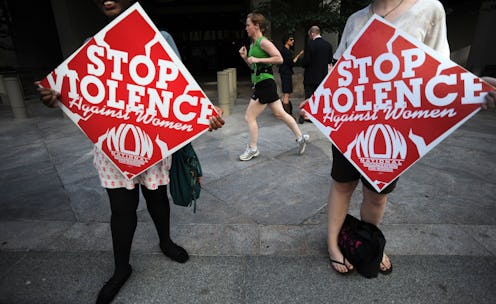Women have been fighting for equality since, well, forever. We've been on the front lines of various movements for justice around the world, and ideally, our feminism is intersecting with other movements like racial, economic, and environmental justice. When we talk about feminism, we have to talk about women of color, transgender women, women from low-income backgrounds, women with different sexualities — in short, all women, not just those who are extremely privileged. But even as we talk about these things, we have to acknowledge the importance of fighting for equality on a political and structural level. Throughout U.S. history and well into the present day, many sexist U.S. laws and policies on the national, state, and local levels have worked to oppress women, either explicitly or indirectly.
From restrictions on reproductive healthcare access to citizenship laws, women have had to deal with their fair share of institutional discrimination. Even as the 19th Amendment, giving women the right to vote, and the attempt to ratify the Equal Rights Amendment came to define 20th century feminism, other laws were actively anti-feminist — this includes policies that opposed a higher minimum wage and actions against climate change, because these, among other causes, are feminist concerns as well. Here's a list of some of the most explicitly misogynist laws from U.S. history; some of them have thankfully disappeared into obscurity while others continue to thrive today.
1. In the 1855 case Missouri v. Celia, a black female slave is declared “property."
2. In the 1873 case Bradwell v. Illinois, the Supreme Court found that the right to choose one's profession was not a protected right, which meant that women could legally be excluded from practicing law.
3. During the Great Depression, the National Recovery Act of 1932 forbade more than one family member from holding a government job, which caused many women to lose their jobs.
4. In the 1948 case Goesaert v. Cleary, the Supreme Court upheld a state statute prohibiting most women from serving or selling liquor. Women who were immediate relatives of male tavern keepers were exempt.
5. According to a 2010 clause from the U.S. State Department's Foreign Affairs manual, a child born outside of marriage can, in certain cases, only be granted citizenship if there is a proven established relationship between the child and their father. This clause is still active today.
6. Arizona requires that women seeking abortions must first undergo a transvaginal ultrasound, a procedure that, in addition to being unnecessary, has been compared to rape.
7. An 1872 California law resulted in the overturning of a man's conviction after he snuck into her home and raped her while she was asleep, pretending to be her boyfriend. Because he was only impersonating her boyfriend and not her husband, he was released. This law was only overturned in 2013.
If you have ever doubted the continued existence of misogyny, now — or centuries ago — would be the time to do away with any skepticism you might have about the constant inequality that women face.
Images: Getty Images (4)
